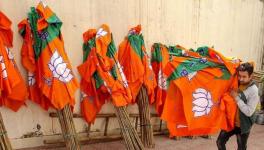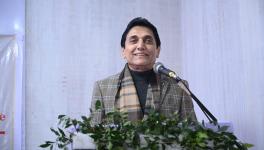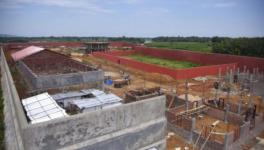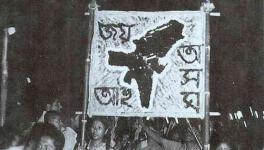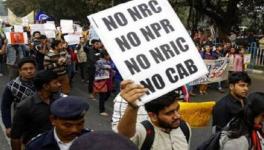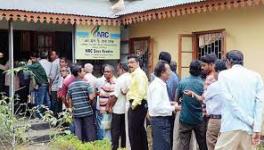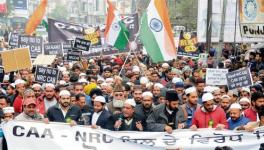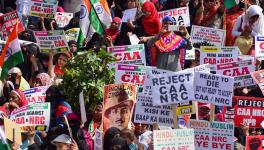Why NRC in Assam May Create Another Kashmir
The finalisation of the National Register of Citizens (NRC) in Assam marks the culmination of the decades-old movement for weeding out foreigners from the state. Yet the politics over illegal immigrants, even the NRC, is likely to continue until 2021, when both Assam and West Bengal are due to have their Assembly elections.
For the moment though, nearly 20 lakh people will rejoice over their inclusion in the NRC – and another 20 lakh will be traumatised at the fate awaiting them. These 40 lakh had been excluded from the draft NRC that was released last year.
Hope will beckon those not in the final NRC, as they will have 120 days to appeal against their exclusion to the Foreigners’ Tribunal (FT), which determines whether or not a person is an Indian citizen. The FT’s decision can be appealed against in the High Court and then in the Supreme Court.
Yet, the excluded will agonise over having to raise finances to negotiate a decidedly cumbersome legal process, even though the Assam government has promised assistance to them. Mostly poor and largely illiterate, they will fear the consequences of becoming stateless. Until now, those declared foreigners by FTs were forthwith packed off to detention centres.
According to an affidavit, the state government submitted to the Supreme Court, FTs declared 1,03,764 people foreigners between 1985 and 2018. Of them, according to Minister of State for Home GK Reddy, a little over 63,000 were declared foreigners through ex-parte proceedings. Ex-parte means that they were not present during the hearing for determining their citizenship status.
Foreigners packed off to detention centres are supposed to be deported to Bangladesh, from where they had allegedly come. But this is unlikely to happen, evident from Foreign Minister S Jaishankar’s recent assurance to Dhaka that the identification of citizens and non-citizens in Assam’s is India’s internal matter.
Given the sheer number of people who have been excluded from the NRC, it is inconceivable that any government will let them languish in detention centres. This has spawned suggestions of providing them work permits, but denying them the right to vote and own property.
No doubt, the exclusion of 20 lakh people from the NRC will come down, even dramatically, after they exhaust their three avenues of appeals. This should silence all those who had floated, in the past, fantastic figures about the number of illegal immigrants in Assam.
The final NRC also challenges the Bharatiya Janata Party or BJP’s campaign of targeting only the Muslims among illegal Bangladeshi migrants in Assam. Its agitation had been initially directed against outsiders, or those Indian citizens who controlled the levers of the state economy. The Rashtriya Swayamsevak Sangh (RSS), the BJP’s parent body, insidiously turned the movement against Bangladeshi Muslims.
This is testified by Rajat Sethi and Shubhrastha in their book, The Last Battle of Saraighat: The story of the BJP’s rise in the North-east, which was published in 2017. RSS leader Ram Madhav wrote the foreword of The Last Battle. The book identifies Shubhrastha as an inmate of Madhav’s office and Sethi as the political advisor to Manipur Chief Minister N Biren Singh.
The two authors credit the RSS for transforming the Assam agitation from an “anti-bahirgat [outsider] to being an anti-videshi [foreigner] movement.” They write, “In gradual course of time, the sentiments were further directed against the immigrant Bangladeshis and later against the Bangladeshi Muslims.”
They say that the RSS, after a series of meetings, stated that Bangladeshi Hindus were asylum-seekers and Muslims were anupraveshkaaris or infiltrators. “It [RSS] took a severe position against the Muslim migrants, articulating [in contrast] the idea of selective protection to Hindu migrants in Assam,” they write. The so-called “severe position” implied demonising Muslims as illegal migrants.
The BJP’s ideological orientation has had its leaders to rubbish the NRC. They have been stung by the figures, which suggest that more Bengali Hindus have been excluded from the NRC than Muslims. They forgot that the rise in the percentage of Muslims in Assam’s population, from 30.92% in 2001 to 34.22% in 2011, might have been fuelled by their high fertility rate than infiltration from Bangladesh. Muslims, politically persecuted for decades, have learnt the art of maintaining their documents establishing their Indian citizenship. This stood them in good stead in the NRC exercise, which was technology-driven.
By contrast, Bengali Hindus were negligent on this count, believing they wouldn’t be deported by the Indian state, which they perceived as Hindu. They believed that it couldn’t deport them as they were Hindu refugees.
It is unlikely that the BJP will abandon Bengali Hindus, who have been the most avid supporters of the RSS since Independence. Over the last six years, the BJP-RSS have portrayed themselves as the saviours of Hindus. Abandoning Bengali Hindus could become the BJP’s Achilles’ heel elsewhere in the country, particularly in West Bengal, which, like Assam, will have its Assembly elections in 2021.
The question before the BJP is: How does the party balance its interests in Assam with those in Bengal and other states? The BJP has five possible options to do so.
It will try to ensure that FTs, which are supervised by those who are essentially state employees, declare a good number of Bengali Hindus who have been excluded from the NRC as Indian. This possibility has emerged from an interpretation of Assam Finance Minister Himanta Biswa Sarma’s recent remark: “The people who are excluded [by NRC] will neither be Indians nor foreigners. Only tribunals can say that. The final numbers will be provided by the tribunals [FTs], and that is something we have to focus on.”
The BJP’s second option could be to initiate measures for creating new categories among the NRC-excluded for their inclusion. This will likely happen after the retirement, in November, of Chief Justice of India Ranjan Gogoi, whose bench has been supervising the NRC. “We, Dispur and Delhi, have started thinking of an alternative device to expel illegal foreigners,” Sarma said recently. The “alternative device” has been interpreted to mean giving a long rope to Bengali Hindus and targeting Muslims.
Its third option will be to enact the Citizenship Amendment Bill, which disallows the deportation or imprisonment of Hindus, Jains, Sikhs, Buddhists, Parsis and Christians of Bangladesh, Afghanistan and Pakistan who entered India without valid documents before December 31, 2014. This definition will also include those Bengali Hindus who came to India after March 25, 1971, the cut-off date for the NRC bureaucracy to identify foreigners.
However, the enactment of the Citizenship Bill will drive a wedge between the Assamese, Hindus and Muslims alike, and Bengali Hindus, as had happened in January, when the Narendra Modi government was reportedly planning to turn it into a law. The BJP could seek to paper over the divide through the High-Level Committee, which was recently constituted to implement Clause 6 of the 1985 Assam Accord.
The High-Level Committee inserted a public notice in newspapers of August 22, 2019, inviting people to suggest proposals for reserving seats in Parliament, the Legislative Assembly and local bodies for the “indigenous tribal, indigenous Assamese and other indigenous people of Assam”. The notice also spoke of providing reservation to them in government jobs and public sector undertakings, among other measures.
The High-Level Committee’s recommendations could be offered as sops to the Assamese for diluting their opposition to the Citizenship Bill. Alternatively, the Committee could grant benefits to indigenous communities, which will require to be defined first, in a way that could undercut the possibility of the Assamese uniting to oppose concessions for Bengali Hindus; with whom the former has been engaged in competition since the 19th century.
It might seem counter-intuitive why the BJP will favour Bengali Hindus, who constitute just about 12 to 13% of Assam’s population (according to the estimate of the Centre for the Study of Developing Society based on poll surveys), at the risk of alienating the larger Assamese community. For one, Assam is a dense mosaic of communities, each inclined to pulling in different ways to protect its interests.
For the other, the Opposition, represented by the Congress, has collapsed; its organisation is moribund and perceived as incapable of translating popular discontent into electoral gains. This was indeed the reason why months after the protests against the Citizenship Bill in January, the BJP won nine out of Assam’s 14 Lok Sabha seats in the general election, even though it secured less than 1% more votes than the Congress. Opposition unity, in the first-past-the-post system, plays a crucial role in who wins or loses.
Otherwise too, Assam does not have the same electoral significance for the BJP as West Bengal, which accounts for 42 seats in the Lok Sabha. The key element in the BJP’s electoral strategy has been to consolidate Hindus on the Hindutva plank in large states and winning them over to command majority at the Centre. Its Hindutva plank will be weakened in case it is seen to be abandoning Bengali Hindus. Thus, taking an electoral risk in Assam is worth the gains to be had in big states.
The BJP’s fifth option will be to do a Kashmir in Assam – that is, to declare Assam’s Barak Valley, which is predominantly Bengali in its culture, a Union Territory. The demand to carve out the Barak Valley has been intermittently raised. It might even come as a relief to a section of Assamese insistent on preserving the purity of their identity – and not having to face competition from Bengalis.
It should matter little to the BJP whether or not the Assamese are agitated, for it will have a reason to preen and prance before its Hindu vote banks in West Bengal and in north India. Obviously, everyone will wait for Home Minister Amit Shah to spell out his new position on NRC.
Ajaz Ashraf is a freelance journalist in Delhi. Views are personal.
Get the latest reports & analysis with people's perspective on Protests, movements & deep analytical videos, discussions of the current affairs in your Telegram app. Subscribe to NewsClick's Telegram channel & get Real-Time updates on stories, as they get published on our website.










